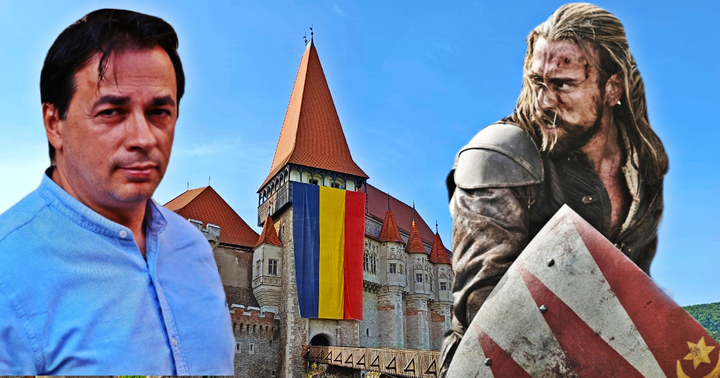Why doesn’t a Catholic Hungarian nobleman speak Romanian in a Hungarian film in the territory of the Kingdom of Hungary? The answer is obvious, said Bán János, the author of the Hunyadi novels under the pseudonym Bán Mór, to Demokrata.
At one of Europe’s most prestigious television events, the MIPCOM Cannes premiere, a historical series called “Hunyadi” based on the novel series by Bán Mór will be presented in Cannes under the title “Rise of the Raven.” Adevărul newspaper published an article by Matei Blănaru, a doctoral student at the University of Bucharest, about the film about Hunyadi János, titled “The Hungarian Soft Power and Viktor Orbán’s Dream,” which accuses Hungarians of appropriating Romanian culture. Since the characters in the series speak in their mother tongues – for example, the Sultan in Turkish, the Habsburgs in German – the Romanian author argues that despite this, Hunyadi János in the film will not speak Romanian, even though it is widely known that he was Romanian.
“Why doesn’t a Hungarian Catholic nobleman speak Romanian in a Hungarian film set in the territory of the Kingdom of Hungary? The answer is obvious. The same reason why Petőfi didn’t recite the National Song in Serbian or Slovak. Why Zrínyi spoke Hungarian with Hungarian nobles, and not in Croatian. Why József Attila wrote his poems in Hungarian. My grandfather always said, everyone is a bit right. But our own truth is the most important to us. We believe in that,” said Bán János to Demokrata, reacting to the Romanian accusations.
According to the author, we are talking about a sensitive issue, as since Trianon, Hungarians have bitterly experienced not only the loss of their territories and cities, but also the claims of successor states on our past and history.
“The Romanians, the Slovaks primarily, but also the Serbs and Croats, immediately began to appropriate Hungarian historical past, thereby gathering further arguments for their territorial claims to the ‘ancient Romanian, Slovak, etc.’ lands,” he said.
Thus, the Slovak magnate Csák Máté, the Hungarian king Mátyás sitting on the throne, became Romanian, Slovak nobleman Benyovszky Móric, and unfortunately, the list could go on.
The Hungarian who does not clench his fists when he sees a Slovak or Romanian flag on the battlements of Trencsén, Orava, Pozsony, or Vajdahunyad castle due to this pain naturally understands nothing – said Bán Mór.
Therefore, the appropriation of the past started about a hundred years ago in earnest, but according to the author of Hunyadi, it may have been going on for much longer.
“I once said in an interview that
if we do not make a film about Hunyadi, then the Romanians will eventually.
After the TV series now being presented, they will likely come to their senses. We are talking about two parallel narratives, and the question is not actually about the true origin of the Hunyadi family, but whether they considered themselves Hungarians or Romanians. The Romanians are now spinning why the members of the family at home in Hunyad are not speaking Romanian to each other, when in the series the characters representing different nations more or less speak in their own languages. First of all, no one can provide a definitive answer from five hundred years ago on whether Hunyadi’s mother, whose name is not mentioned in any document or contemporary written source, spoke to her son. From here on, we can talk about a matter of belief. We, Hungarians, believe it was in Hungarian. The Romanians would like to believe it was in Romanian,” explained the author, who believes that during the socialist decades, Hungarian cultural policy fiercely suppressed and eradicated the Hungarian national outlook.
It is less known that István Bibó had a note in which he wrote how good it would be if a film about Hunyadi János was finally made, but if it was made, let’s be very careful not to appear too Hungarian.
“This mentality is familiar. Bibó even suggested, for example, Hunyadi should make the sign of the cross in an orthodox way in the film.”
The Romanians would have loved that version if it had been made
– said Bán Mór.
According to the novelist, the origin of the Hunyadi family cannot be translated into present-day national affiliation, as it did not have that kind of significance in the 15th century.
“Not to mention that it seems to me,
the Romanian people in the current sense did not even exist in the not so distant past in the territories known as Kunország. They didn’t even call themselves Romanian, but Vlachs. But then how can we decide the ancient dispute? One thing is for sure, actions show the national allegiance of a person. Indeed, Hunyadi János and his son, King Mátyás, acted with heart and soul as Hungarians, even against the Wallachians of Transylvania and Moldova if needed. Hunyadi was a Catholic Hungarian noble who defended Hungary and Christian Europe, even when the Wallachians from Transylvania came to destroy and devastate Transylvania on the side of the Turks, which they now retrospectively think of as Romanian territory,” the author concluded.
A few years ago, Magyar Demokrata conducted a cover interview with Bán János. During this interview, we asked the artist if a Hunyadi plundering wouldn’t start with the series, as what if suddenly Romanians, Serbs, or others remember that Hunyadi is actually their hero, and Hungarians just stole him?
The author considered this to be a possibility even back then.In the interview, among other things, we talked with the author about
- the present-day resonances of the series
- whether we are experiencing a renaissance of historical films or not
- why we need to tell our victories and defeats to the world
The full interview can be read here
💘love it
💘love it
😡infuriating
😡infuriating




